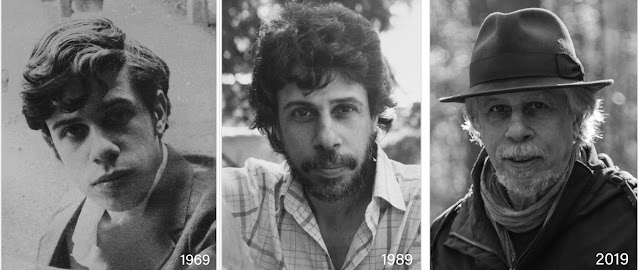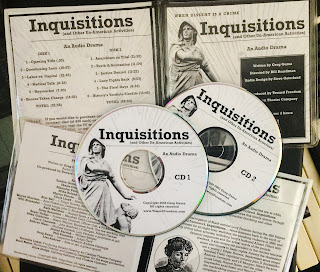…a skilled writer who has immersed himself in Vermont life and politics for decades. — Sasha Abramsky
…the first executive in Pacifica who has been willing, and able, to share his experiences…. They ought to be required reading for all PNB and LSB members. — Nalini Lasiewicz
By Eugene M. Scribner
BURLINGTON, VT — Managing Chaos: Adventures in Alternative Media is Greg Guma’s intimate look back at his experiences over 60 years as a journalist, activist, editor and progressive manager — of newspapers and magazines, social change organizations and Pacifica Radio, the country’s original listener-supported network.
 |
| Photos: Left, by Kat Farnham/Bennington; Center, Anne Winther/Burlington; Right, Jesse Guma/Rochester |
His 15th book — in a career that formally began in 1968 with reporting and taking photos for the Bennington Banner, a southern Vermont daily, Managing Chaos discusses the evolution of radio and television, the impacts of concentrated media ownership, the rise of the alternative press, and his own work — before and during the progressive revolution that changed Vermont’s power structure.
Weaving together a lively, granular account of what he saw as Pacifica Radio’s “post-revolutionary” CEO for two years and episodes from his earlier life as a stressed out student, rookie reporter, and radical organizer, Guma also explores the challenges of maintaining democratic institutions in a culture of distrust and polarization — striking the balance between truth and advocacy, observing and participating, the personal and political — and of managing conflicts with persuasion instead of force.
He calls Managing Chaos “a media saga, a personal story, and a cautionary tale.” The 317-page, illustrated paperback edition will be published by Maverick Books and available for online orders July 25, 2o24. For review copies or interviews, email Mavmediavt@gmail.com.
From 1978 to 1990, Guma edited and wrote for The Vermont Vanguard Press, a groundbreaking alternative weekly, and syndicated feature articles and columns internationally for decades. He also started and managed three bookstores, including Maverick Media in Burlington and Revolution in Santa Monica. Beginning in 1986, he began editing a progressive global affairs publication, Toward Freedom, continuing for more than 12 years. In 2004, he co-founded another weekly, Vermont Guardian, with Shay Totten. He became Pacifica’s Executive Director in 2006.
From Politics to the Paranormal
In 1989, Guma wrote The People’s Republic: Vermont and the Sanders Revolution, an eye-witness account of how the state went from being loyally Republican to culturally and politically progressive. At the time former Governor Phil Hoff called it “the most complete, knowledgeable and fairest description” of Bernie Sanders’ mayoral years. More than 25 years later, Guma and the widely-praised book became primary sources for leading journalists covering Sanders’ two presidential campaigns.
Working with UVM’s Center for Research on Vermont, he recently followed up with Restless Spirits & Popular Movements: A Vermont History (2021), which revisits the state’s past through memorable events and people, “reclaiming stories sometimes lost or forgotten along the way.” Vermont History lauded it for drawing from “decades of reporting to offer insights into some of the major political actors and movements from the late 1960s to the present.”
One of the early stories that captured Guma’s eye concerned the Eddys, a family of alleged mediums in central Vermont during the 1870s, and the remarkable people who converged on the family’s farm and “circle room.” After writing about this for several publications, including Fate Magazine, he developed an historical novel based on what he had learned, one that dramatizes the events and characters surrounding the fateful meeting of investigator Henry Olcott and Helena Blavatsky, the remarkable occultist who created the Theosophical movement.
A romantic mystery of the paranormal, Spirits of Desire (2004) has been compared to E.L. Doctorow’s Ragtime. According to Joe Citro, it’s a well-told, remarkable story playing out “against a tapestry of social, intellectual, religious, political and scientistic forces.”
More recently, Guma revisited the same period with Into the Mystic (2023), which digs into the actual events dramatized in the novel, and explains spiritualist and theosophical beliefs, as well as subjects like karma, reincarnation, and astral projection. Spirits of Desire was the inspiration for Woman of Another World, a film adaptation currently being developed by Nora Jacobson.
Guma has co-authored books with world citizen pioneer Garry Davis and Kentucky civil rights leader Georgia Powers. Working with Robin Lloyd and Green Valley Media, he’s written scripts and narrated documentaries about Haiti, Guatemala, Vietnam and the legendary Bread & Puppet theater troupe. Here’s an example: Journey Home. He also edited the colorful photo book, Bread &. Puppet: Stories of Struggle and Faith from Central America (1985).
Davis and Guma worked together on two books, the first a recap of Davis’ decades as leader of the world citizen movement. In addition, their Passport to Freedom: A Guide for World Citizens (1992) explains how to use the World Passport and other documents Davis created and distributed to defend human rights around the world. They followed up with A Global Odyssey (2000), which covers Davis’ later exploits challenging borders and spreading world citizenship in Japan.
Powers asked Guma to work with her to dramatize the life of a beloved ancestor in 2002. The result was Celia’s Land (2004), which combines history with informed, sympathetic speculation. It reveals how Powers’ aunt, Celia Mudd, who was born into slavery before the Civil War, became owner of the Lancaster family’s farm in Kentucky, and defended her rights in an extraordinary 1903 trial.
In 2003, Guma completed Inquisitions (and Other Un-American Activities), a play dramatizing the struggle for workers rights and civil liberties, especially Chicago’s 1886 Haymarket riot and show trial. It uses the interrogation of activist Lucy Parsons during the 1919 Palmer raids to explore timely themes and recreate the movement for an eight-hour workday, the Haymarket bombing, and hanging of four activists. Since initial performances at Burlington City Hall, it has been distributed as an audio drama, airing on hundreds of radio stations and available as a podcast series.
Guma’s other books include Uneasy Empire (2003), about the struggle over globalization and post- 9/11 repression; Big Lies (2011), looking at how corporations, politicians and media can warp reality and undermine democracy; Progressive Eclipse (2012), a follow up to The People’s Republic; Dons of Time (2013), a novel Kirkus calls “well-constructed, action-flooded sci-fi set in a realistic historical world”; Fake News (2018), on journalism in the “age of deceptions”; Planet Pacifica (2021), a short introduction to the network’s problems; and Prisoners of the Real (2023), an intellectual journey about the price of hyper-rationalism and control that opens the door to a new vision of freedom and cooperation.
Bread & Puppet (editor) * The People’s Republic * Passport to Freedom Uneasy Empire * Reign of Error (editor) * Celia’s Land * Inquisitions * Spirits of Desire * Dons of Time * Progressive Eclipse * Big Lies
Fake News * Planet Pacifica * Restless Spirits & Popular Movements
Into the Mystic * Prisoners of the Real * Managing Chaos
— From New England Press, Seven Locks, Toward Freedom, University of Vermont and White River Press, Fomite, Maverick Books




















